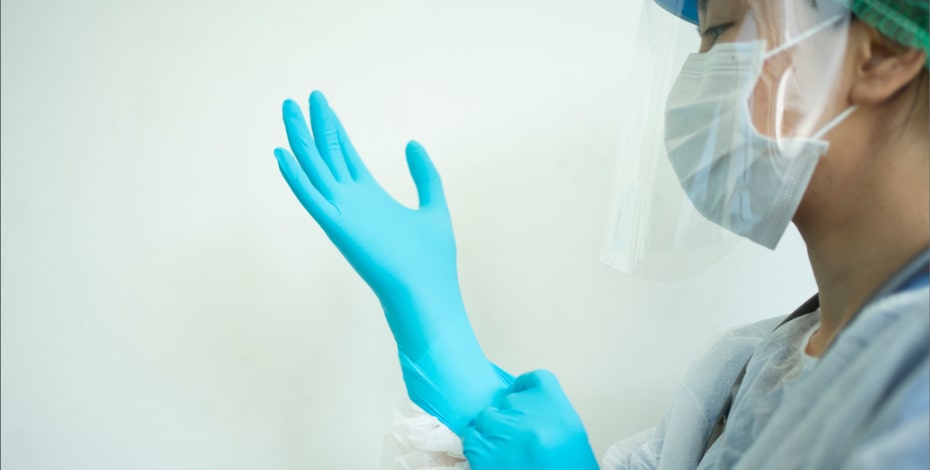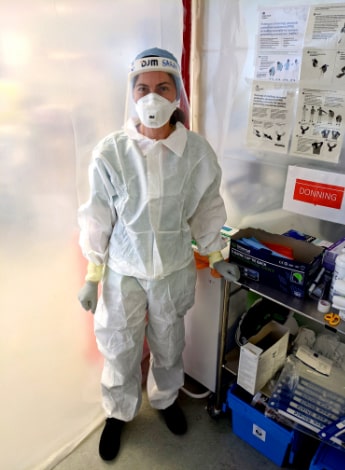
Fighting COVID-19: physiotherapist as carer

As Sarah Miller returns home from a morning run, she is alert to news that a second wave of COVID-19 is enveloping two of Australia’s largest cities.
It’s alarming to hear, as she has only been back in Melbourne a few months after being in the UK treating patients during the early days of the deadly coronavirus pandemic.
Having seen first-hand its devastation, her message to everyone is simple.
‘When you see and hear people fighting for breath, staying at home to curtail the spread of the virus isn’t too much to ask for. Stay home, wash your hands and keep your distance from others—you can make a difference to this virus’ impact.’
It’s pragmatic advice from the physiotherapist, who inadvertently stepped on to the medical frontline of the COVID-19 battle after moving to London last year to progress her career.
After a carefree European summer, a silent killer would soon test the respiratory physiotherapist’s resolve and professional skill. It would become a career experience like no other.
Even before the deadly coronavirus was named, Sarah was helping manage a medical response to what would become a viral pandemic, with its aggressive ability to spread rapidly catching some governments and health systems off-guard.
She remembers being concerned with how reactive the UK government and health system response was, particularly with respects to personal protective equipment (PPE), testing and clear communication.
Like other medical professionals, she treated her first patient without PPE.
‘I treated a handful of patients for weeks that had COVID-19 symptoms; however, we weren’t testing patients.
'So that was scary, particularly because I’m an asthmatic, was working internationally and as a physiotherapist we complete high-risk activities such as close contact and coughing techniques.’
With her respiratory skills in demand and concerns for safe staffing, she moved to one of the UK’s largest medical facilities, Kings College Hospital NHS Trust.
By then, authorities were advocating for more stringent care practices amid the rapidly evolving health crisis.
‘We knew it was something more virulent and contagious, so we changed our normal practices by wearing scrubs, changing clothes in between clean and dirty wards, not carrying any personal items, or even stethoscopes.
'Most importantly, the change in practice was teamwork and a greater attention to wellbeing.’
The ICU level was at an alarming 300 per cent capacity, with 90 per cent of all admissions being COVID-19.
A mobile morgue was in the hospital carpark, and the city appeared at breaking point as government officials called for a calm and a unified approach to handling the crisis.
For the hospital, it meant a transdisciplinary approach to care was the best way forward to managing ‘a huge layer of health economics’.
The public response was overwhelming to their efforts, with an onsite wellbeing centre full of donations and discounts from various providers.
‘This was greatly appreciated,’ she says. ‘Every hour things were changing, yet overall, it was an incredibly rewarding experience where I saw some of the best teamwork I have ever seen in a hospital setting.
‘There was increased team debriefs, and a greater focus on transdisciplinary care, as well as increased cross-site and cross-team communication.
'Even though we were at 300 per cent capacity, we were able to manage it quite well, because everyone was willing to adapt and be flexible in getting the job done.’
Three disciplines—medical, nursing and physiotherapy— would make up the hospital’s COVID team, as other allied health workers completed their assessment remotely.
As a team leader, Sarah was responsible for physiotherapy management, which involved access pathways, the prone team, life support recommendations and starting early rehabilitation.
She also took a lead in clinical education, and developed effective patient and staff communication, as well as successfully championing the introduction of a ‘buddy system’ and other training programs that assisted the teaching of junior physiotherapists and all health professionals.
Amid the heightened awareness for safety precautions, she described her day-to-day work as ‘bread and butter with some tweaks’.
The mainstay of her work was supporting the physical recovery of patients, who often required a month on a life-support machine.
At high risk of numerous complications, patients needed to start moving even while on a machine.
‘We were very sweaty in those polar bear suits,’ she says about the physicality required in managing recovery. ‘But movement was vital to their recovery.’
During treatment sessions, there were various modifications to clinical reasoning. Hygiene remained paramount.
Stethoscopes were deemed a transmission risk, the theatre-style ventilators lacked sophistication and there were side-effects from the varied sedation medication that was being used, which resulted in memory issues for the majority of survivors.
Instead, clinical assessment required a greater reliance on using hands and calculated intuition.
‘It was a challenging way of changing your clinical practice,’ Sarah says.
‘There are so many unknowns about this virus yet you had to be hands-on with helping patients in need. While we always had protective gear, you still couldn’t help but think “should I really be putting myself at risk?”

Second to memory complaints was the large emotional health barrier to patient recovery, so the hospital fast-tracked a program that introduced video conferencing to patient care.
‘The iPad program was an incredibly helpful strategy. Connectivity to loved ones is important. Being able to speak with family members improved outcomes in therapy sessions, and this became an ongoing part of the recovery process.
'It was also another example of how our ability as a workforce thrived with doing what was needed rather than being fixed or focused on the “red tape” that usually exists in hospitals,’ she says.
The intensity of the recovery process did bring other issues, with Sarah noticing a large amount of musculoskeletal complaints among patients.
She believes these were also attributable to a health economic issue, as ‘the workforce struggled to meet the demand, so these outcomes come as a consequence of poor positioning’.
Unfortunately, not all patients would advance to rehabilitation.
‘Even though you were doing all you could, there were deaths. What made this even harder was that family couldn’t be with their loved ones at that time.’
Compassion and humanity, she says, helps sustain a community during a crisis, and while her COVID-19 experience was incredibly stressful, stepping up to a challenge and driving effective change was familiar territory.
At 18 Sarah moved to the US to study science and business while pursuing elite sport ambitions.
For three years she was captain of the University of Louisville’s Power 5 college tennis program; and credits her athletic background in providing a good foundation both professionally as a leader and in sustaining her own wellbeing, especially during COVID-19.
Rather than taking a 45-minute train ride to work, she opted for a two-hour bicycle ride and walk through near-deserted streets.
‘It was a combination of social distancing and wanting to stay fit and well.’
She used the extended travel time to talk with friends and family, many of whom wanted her to return home.
‘Their worry was understandable, especially as there was such a distance between us.’
Following the end of the COVID-19 surge response, Sarah is happily back in Melbourne and is looking to pursue a career in health consulting, and to fulfil a passion for improved health efficiency and accessibility for all Australians.
The graduate of the Doctor of Physiotherapy program at University of Melbourne has always maintained an interest in transformative healthcare reform and community.
Before moving to London she led work on other health priorities, such as disability and family violence, and was president of St Vincent de Paul Society Victoria, working with inner city homelessness.
From 2017 to 2019 she was a member of the APA Victorian Branch committee.
Her experience in helping manage a medical response to a global pandemic at just one major metropolitan hospital has motivated a desire to contribute to removing barriers to enhance clinical outcomes, through leadership and strategy, for an effective health system.
'COVID has really brought to light how much attention health needs globally. And I don’t mean economically—as a society, a system and a team we need to be less complacent and more focused on our influence and consumer needs.’
As for right now, Sarah is in her fourth lockdown this year.
‘London, like the United States, had COVID hospitals, not wards, and that is not a position we want in Australia—we need some more ANZAC spirit and to play by the rules like New Zealanders did to stem the spread of coronavirus.’
© Copyright 2024 by Australian Physiotherapy Association. All rights reserved.





